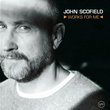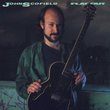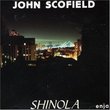| All Artists: John Scofield Title: Rough House Members Wishing: 1 Total Copies: 0 Label: EMI Distribution Release Date: 4/23/1991 Genre: Jazz Styles: Modern Postbebop, Bebop Number of Discs: 1 SwapaCD Credits: 1 UPC: 081227965723 |
Search - John Scofield :: Rough House
 | John Scofield Rough House Genre: Jazz
|
CD DetailsSimilar CDs
|
CD ReviewsJohn Scofield Rough House Brent E. Forbes | Phoenix, AZ | 09/02/2002 (4 out of 5 stars) "Actually I feel this is essential Scofield. It has a more straight ahead sound at a very high level of musicianship. Very few guitarists are able to negotiate soloing through Coltrane "Giant Steps" style chord changes evident in "Aeleron". Scofield does this with ease like bread and butter. Except for the light overdriven (juicy) sound of his Gibson 335 guitar, which I prefer over his current instrument, this is a no frills bebop CD laden with the classic Scofield signature. You know its him right away. There are a lot of notes being played, but they are quality notes. Hal Galper doesn't play around on this one either. Highly recommended listening for jazz guitar fans." Quintessential Scofield! Carl Johnson | Detroit, MI United States | 08/07/2005 (5 out of 5 stars) "John Scofield currently does not do much for me anymore. I remember though back when this record came out on vinyl in 1978, I listened with awe and excitement. John was still a relative new comer to the jazz curcuit. He was inventive and DARING, which is something I do not hear on his newer post 1995 releases. This album JUST jams from an authentic jazz fusion direction.... and not the biting-hard fusion; but full of punctuated energy. This recotrding is a True classic! The recording is appropriately complex with enthusiasit playing from John and ALL the players. Excellent spin!" Another hidden Scofield classic, quietly developing the guit Bjorn Jensen | California | 08/17/2008 (5 out of 5 stars) "I will never understand why John Scofield's earliest works from the mid-to late 70s, up to about 1981 (beginning with his self-titled debut album in 1977) were not given the attention they deserved at the time of their release, and still are not given a great deal of attention. The central reason why I don't understand this is because no one had ever improvised on the guitar remotely like this prior to his recording of these albums. No other guitar player at this stage truly had a fluency with, or an approach to harmonic concepts comparable to that of a horn or piano player (listen to the Coltrane-ish bridge of track 3, "Ailleron"). By this stage, Scofield had already created a very individual approach to improvising. However, it was not until about halfway through the next decade that he got the attention he richly deserved.
No one had really approached the guitar with viably bluesy approach in a post-bop context before (I am referring specifically to the idea of overtly bending notes on the guitar - bending notes being something that horn players were certainly no strangers to by 1978!). This was something which was to become one of the most influential and ripped-off aspects of Scofield's playing. Scofield's modal command as both a guitarist and composer was also extremely impressive by this stage, and is put to great use throughout the album. I would like to stress that this is NOT a fusion album, or a "jam band" album (or whatever label is being used now) - contrary to the common (and completely incorrect) belief that most, if not all of Scofield's work definitively falls under one of these categories. It would be closer to the mark to say that this album shows a clear influence from John Coltrane's great quartet with McCoy Tyner. "Rough House", along with other early works of Scofield's (His 1977 debut, "Who's Who" from 1979, "Ivory Forest" with Hal Galper from 1980, etc. etc.) are albums that do not get the attention they deserve. The only negative thing I can say about this album is that the recording quality is not great for a recording from the later part of the 1970s. This does however probably have something to do with lack of digital re-mixing/mastering (at least on the CD copy I have), and does not have a particularly negative impact upon the music at hand. Naturally, Scofield was to develop, grow and change over the many years that followed. This album does however sound quite fresh today. Interestingly enough, his sound from this time is indeed closer to the sound he has come back to in more recent times (for example, on his brilliant "Enroute" from 2004 - not an identical sound, but quite similar). Some may consider this album only important for Scofield completists, but I feel that it is far more important than that. In my opinion, this album deserves a place in the collection of any serious listener of John Scofield." |

 Track Listings (6) - Disc #1
Track Listings (6) - Disc #1


